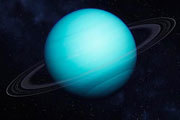This small, rocky planet looks a lot like our moon. Mercury is the second smallest planet in our solar system and is named after Mercury, the Roman messenger to the gods. If the sun didn't toast you first, there'd be some really cool mountain climbing on Mercury
| Properties of Mercury | |
|---|---|
| Mass | 3.303 x 1023 kg |
| Average Distance from Sun | 57.9 million kms/36 million miles |
| Minimum Distance from Earth | 77.3 million kms/48.0 million miles |
| Length of Year | 88 Earth days (to rotate the sun) |
| Rotation Time | 59 Earth days (on its own axis) |
| Angle of Axis | 2 degrees |
| Diameter | 4,878 kms/3,031 miles |
| Number of Satellites | 0 |
| Number of Rings | 0 |
| Number of Moons | 0 |
| Temperature | Average of -270 F to 800 F/-168 C to 427 C |
| Weight on Mercury | A 100 pound person would weigh 37.8 pounds |

|
Venus looks a lot like Earth. There are mountains, valleys and even active volcanoes - except there's no ocean. One thing to keep in mind when watching a sunset on Venus is that Venus spins backwards so the sun rises in the west and sets in east, which is the opposite of Earth. |
| Properties of Venus | |
|---|---|
| Mass | 4.86x1024 kg |
| Average Distance from Sun | 108.2 million kms/67.2 million miles |
| Minimum Distance from Earth | 39 million kms/25 million miles |
| Length of Year | 225 Earth days (to rotate the sun) |
| Rotation Time | 243 Earth days (on its own axis) |
| Angle of Axis | 177.3 degrees |
| Diameter | 12,102 kms/7,520 miles |
| Number of Satellites | 0 |
| Number of Rings | 0 |
| Number of Moons | 0 |
| Temperature | Average of 457 Fahrenheit/855 Celsius |
| Weight on Venus | A 100 pound person would weigh 90.7 pounds |
For the property charts on the rest of the planets, click here.
































